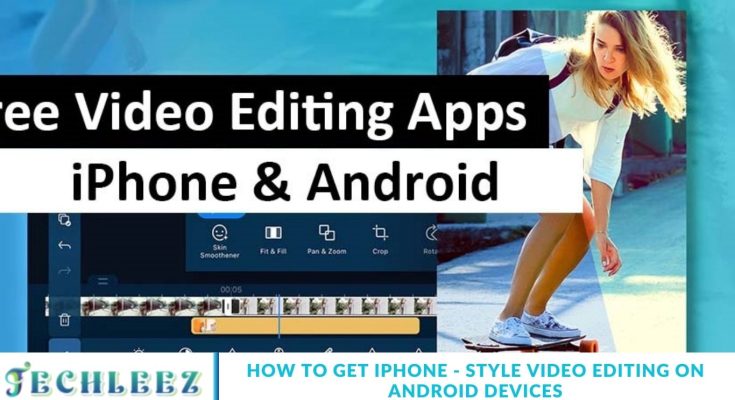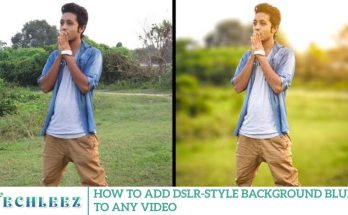The landscape of photo and video editing has dramatically transformed with the rise of smartphones. iPhones have long stood out for their exceptional editing capabilities, powered by cutting-edge hardware and exclusive software features. However, not everyone uses an iPhone, and many Android users are eager to replicate that seamless, high-quality editing experience on their own devices. This demand has fueled the development of numerous apps and techniques designed to bring iPhone-style editing tools to Android smartphones. In this article, we’ll explore what it means to perform iPhone-level editing on Android, how these solutions work, their key features, advantages and disadvantages, and alternative options, and offer a detailed conclusion and final verdict.
What is iPhone Editing in Android?
iPhone editing on Android refers to the use of specialized Android apps and editing techniques that replicate the advanced photo and video editing features typically exclusive to iPhones. These features include portrait mode, premium filters, sophisticated color grading, video stabilization, and more. By leveraging these tools, Android users can bridge the gap between the two platforms and enjoy high-quality editing effects similar to those found on iPhones. This approach enables Android devices to deliver a comparable editing experience, enhancing creativity and output quality for mobile photographers and videographers alike.
How iPhone Editing in Android Works
App Emulation
Many developers design Android apps that emulate the features and user interfaces of popular iPhone editing applications. These apps aim to deliver a similar editing experience, enabling users to achieve comparable professional-quality results on Android devices.
Advanced Algorithms
Cutting-edge image processing algorithms play a crucial role in replicating iPhone-exclusive effects such as portrait mode. By leveraging AI and depth-sensing technology, these algorithms blur backgrounds while keeping the subject sharply in focus, creating stunning, DSLR-like photos on Android.
Cross-Platform Compatibility
Several editing apps are available on both iOS and Android platforms, ensuring users enjoy the same robust features regardless of their device. These apps are specifically optimized for Android performance, offering seamless editing capabilities that rival their iPhone counterparts.
Third-Party Filters and Plugins
Many Android editing apps support a wide range of third-party filters and plugins, expanding their creative potential. These tools often introduce unique effects inspired by, or directly adapted from, popular iPhone editing apps to enhance photo and video editing on Android.
Cloud-Based Editing
Cloud-based editing solutions allow users to seamlessly edit photos and videos across multiple devices, including iPhones and Android smartphones. This technology ensures consistent access to the same editing features, presets, and project files, providing a unified editing experience across platforms.
Features of iPhone Editing in Android
Portrait Mode
Simulates the iconic iPhone bokeh effect by softly blurring the background while keeping the main subject sharp and in clear focus, enhancing portrait shots on Android devices.
Advanced Filters
It offers a diverse selection of premium-quality filters for photos and videos inspired by the sophisticated filter collections found on iPhones.
Color Grading
Equips users with professional-grade color grading tools, enabling precise adjustments to tone, contrast, and color balance for stunning visuals.
Video Stabilization
Includes robust video stabilization features that minimize shakiness and produce smooth, cinematic-quality footage.
Slow Motion and Time-Lapse
Provides creative options for capturing slow-motion and time-lapse videos, mirroring popular iPhone video recording capabilities.
HDR Editing
It supports high dynamic range (HDR) editing to enhance image detail in shadows and highlights, delivering vibrant and well-balanced photos.
AI-Powered Enhancements
Leverages artificial intelligence to automatically optimize photos and videos by adjusting brightness, contrast, saturation, and other key settings for the best possible results.
Manual Controls
It gives users full manual control over essential editing parameters such as exposure, white balance, focus, and more for precise customization.
Face Recognition
Uses advanced face recognition technology to apply targeted edits and effects specifically to faces in both photos and videos.
Cloud Syncing
Enables seamless cloud syncing of edits and projects across multiple devices, ensuring users can access and continue their work from any platform.
Pros of iPhone Editing in Android
| Pros | Description |
|---|---|
| Cost-Effective | Many Android apps are free or cost significantly less than professional iPhone editing software. |
| Accessibility | Allows Android users to access iPhone-like editing features without needing to switch devices. |
| Versatility | Provides a wide range of editing tools and effects, catering to different editing needs and styles. |
| Innovation | Encourages innovation among developers to create high-quality editing tools for Android. |
| User-Friendly | Many apps are designed with user-friendly interfaces, making advanced editing accessible to beginners. |
| Regular Updates | Many editing apps receive regular updates that add new features and improve performance. |
| Customization | Offers extensive customization options, allowing users to fine-tune their edits to their liking. |
| Integration | Can be integrated with other popular apps and services for a seamless editing workflow. |
| Community Support | Large communities and forums offer support, tutorials, and tips for using these apps effectively. |
| No Platform Restriction | Provides high-quality editing tools to users regardless of their choice of smartphone platform. |
Cons of iPhone Editing in Android
| Cons | Description |
|---|---|
| Quality Variability | The quality of Android apps can vary widely, with some not matching the performance of their iPhone counterparts. |
| Hardware Limitations | Some Android devices may lack the hardware capabilities to fully utilize advanced editing features. |
| Learning Curve | Advanced editing tools can have a steep learning curve for beginners. |
| Compatibility Issues | Not all editing apps are compatible with every Android device, leading to potential usability issues. |
| Battery Consumption | Intensive editing tasks can drain the battery quickly on some Android devices. |
| Storage Requirements | High-quality editing apps and their projects can take up significant storage space. |
| Privacy Concerns | Some free apps may have privacy concerns, such as data collection and usage policies. |
| In-App Purchases | Many apps offer advanced features only through in-app purchases, which can add up over time. |
| Performance Variability | Performance can vary depending on the device’s processing power and available RAM. |
| Dependency on Updates | Reliance on regular updates for new features and bug fixes, which may not always be timely. |
iPhone Editing in Android Alternatives
| Alternative | Description | Platform | Pricing |
|---|---|---|---|
| Adobe Lightroom | Powerful photo editing tool with advanced features and cross-platform compatibility. | Android, iOS | Free, Paid Options |
| Snapseed | A versatile photo editing app developed by Google, offering a range of professional editing tools. | Android, iOS | Free |
| VSCO | Popular for its high-quality filters and editing tools, suitable for both photos and videos. | Android, iOS | Free, Paid Options |
| PicsArt | Comprehensive photo and video editing app with a vast array of tools and effects. | Android, iOS | Free, Paid Options |
| FilmoraGo | User-friendly video editor with a wide range of features, including effects and transitions. | Android, iOS | Free, Paid Options |
| KineMaster | Professional-grade video editing app with support for multiple layers and advanced editing tools. | Android, iOS | Free, Paid Options |
| Canva | Graphic design tool that also offers robust photo and video editing features. | Android, iOS | Free, Paid Options |
| InShot | Easy-to-use video editor with powerful tools and effects, ideal for social media content creation. | Android, iOS | Free, Paid Options |
| Pixlr | Photo editor with a range of effects, overlays, and filters, suitable for both beginners and professionals. | Android, iOS | Free, Paid Options |
| LumaFusion | Professional video editing app available on iOS, known for its powerful features and user-friendly interface. | iOS | Paid |
Frequently Asked Question
What does iPhone editing on Android mean?
iPhone editing on Android refers to using Android apps and techniques that replicate the advanced photo and video editing features found on iPhones. This includes effects like portrait mode, color grading, video stabilization, and more, enabling Android users to achieve similar high-quality results.
Can Android phones really match the iPhone’s editing quality?
While hardware differences exist, many Android apps use advanced algorithms, AI, and third-party plugins to closely mimic iPhone editing features. With the right apps and settings, Android users can achieve impressive, professional-grade edits.
Which Android apps offer the best iPhone-like editing experience?
Popular apps like Adobe Lightroom, Snapseed, VSCO, and FilmoraGo offer powerful editing tools inspired by the iPhone’s capabilities. Some apps specifically emulate the iPhone’s portrait mode and filters to bridge the editing gap between platforms.
Is portrait mode available on Android like on the iPhone?
Yes, many Android apps now offer portrait mode or bokeh effects that blur the background while keeping the subject sharp, similar to the iPhone’s native feature.
Are there any free apps to get iPhone-style editing on Android?
Yes, several free apps, such as Snapseed and VSCO, provide advanced editing features inspired by iPhone tools. However, some premium features may require in-app purchases or subscriptions.
How does AI improve photo and video editing on Android?
AI-powered enhancements automatically adjust brightness, contrast, saturation, and other settings to optimize images and videos, making editing faster and more accessible without sacrificing quality.
Can I sync my editing projects across devices?
Many modern editing apps offer cloud syncing, allowing you to access and continue editing your photos and videos seamlessly across Android and iOS devices.
Conclusion
While iPhones have long been celebrated for their exceptional photo and video editing capabilities, Android users no longer need to feel left behind. Thanks to a growing selection of powerful Android apps, advanced algorithms, and AI-driven tools, it’s now possible to replicate many of the iPhone’s signature editing features—such as portrait mode, color grading, and video stabilization—right on Android devices. Whether through app-emulation, cross-platform compatibility, or cloud-based editing, Android users can enjoy a comparable, high-quality editing experience. By leveraging these tools and techniques, Android photographers and videographers can elevate their creative projects and produce stunning visuals that rival those created on iPhones. Ultimately, the choice of platform no longer limits your editing potential.




